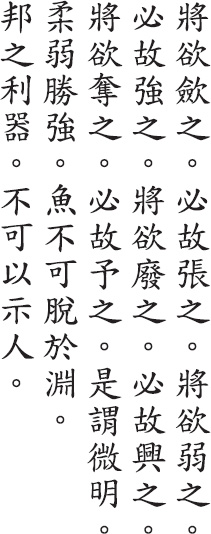36
 |
What you would shorten you first should lengthen what you would weaken you first should strengthen what you would topple you first should raise what you would take you first should give this is called hiding the light the weak conquering the strong fish can’t survive out of the depths a state’s greatest weapon isn’t meant to be shown |
TE-CH’ING says, “Once things reach their limit, they go the other way. Hence, lengthening is a portent of shortening. Strengthening is the onset of weakening. Raising is the beginning of toppling. Giving is the start of taking. This is the natural order for Heaven as well as for Humankind. Thus, to hide the light means the weak conquer the strong. Weakness is the greatest weapon of the state. But rulers must not show it to their people. Deep water is the best place for a fish. But once it is exposed to the air, a fish is completely helpless. And once rulers show weakness, they attract enemies and shame.”
LU HUI-CH’ING says, “To perceive shortening in lengthening, weakening in strengthening, toppling in raising, taking in giving, how could anyone do this if not through the deepest insight? This is the hidden light. Moreover, what causes things to be shortened or lengthened, weakened or strengthened, toppled or raised, taken or given is invisible and weak. While what is shortened or lengthened, weakened or strengthened, toppled or raised, taken or given is visible and strong. Thus, the weak conquer the strong. People should not abandon weakness, just as fish should not leave the depths. When fish leave the depths, they are caught. When people abandon weakness, they join the league of the dead.”
WU CH’ENG says, “‘Hiding the light’ is the same as ‘cloaking the light.’” (See verse 27.)
SUNG CH’ANG-HSING says, “According to the way of the world, the weak don’t conquer the strong. But Lao-tzu’s point is that the weak can conquer the strong by letting the strong do what they want until they become exhausted and thus weak. Those who cultivate the Tao speak softly and act with care. They don’t argue about right or wrong, better or worse. They understand the harmony of Heaven and Earth, the Way of emptiness and stillness, and become adept at using the hidden light.”
CHANG TAO-LING says, “The Tao is like water. People are like fish.”
CHUANG-TZU says, “The sage is the world’s greatest weapon but not one that is known to the world” (Chuangtzu: 10.3).
HAN FEI says, “Rewards and punishments are the state’s greatest weapon.”
I’ve added Han Fei’s comment here because the strong still rule the day. Although the differences among editions are not significant, both Mawangtui versions of lines five and six abandon the rhyme. I have followed the Fuyi and Wangpi texts here, switching, however, to the Mawangtui versions of line ten, which the Fuyi and Wangpi editions expand into two lines: “the soft conquer the hard / the weak conquer the strong.” The copyist was probably thinking ahead to verse 78, where this couplet does, in fact, occur. Note that the appearance of pang (state) in line twelve of the Fuyi edition and Mawangtui A suggests that both were copied before Liu Pang became emperor in 206 B.C., and the use of his name was forbidden. On the other hand, Mawangtui B has kuo (country), suggesting that it was copied after 206 B.C.